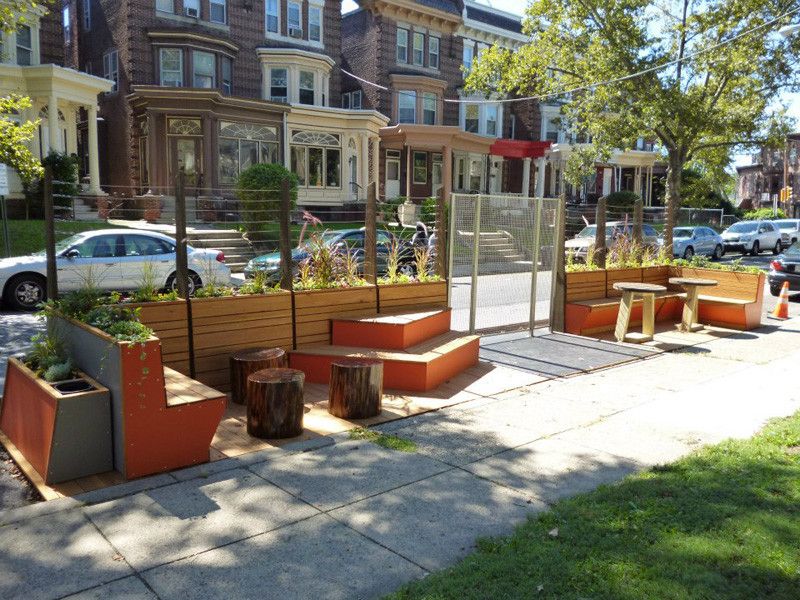Catalyzing Community Capacity
How Philadelphia Can Create Equitable Right-of-Way Stewardship

In 2018, The Lindy Institute for Urban Innovation began to study Philadelphia's processes for the public to implement and steward pedestrian plazas, parklets, and bicycle corrals. The resulting report, Catalyzing Community Capacity: How Philadelphia Can Create Equitable Right-of-Way Stewardship, released on September 18th, 2019, identifies significant barriers for the expansion of right-of-way (ROW) stewardship and proposes steps city and community leaders can take to overcome them, particularly in underserved communities.
Publicly stewarded in-street amenities came to the city in the last decade: Philadelphia initiated parklet pilots in 2012 in University City and formally created its ROW stewardship program in 2014, but relatively few projects were created in the intervening years, and the numbers reaching a plateau of less than 30 overall improvements (Philadelphia currently has 4 pedestrian plazas, 11 parklets and 10 bike corrals created and stewarded by community members). This lack of momentum was the premise for this study.
The report draws from dozens of interviews with local community development professionals, city staff working on these issues and national leaders in public space and placemaking. It balances practical, local feedback with aspirational best practices from peer cities in an effort to further Philadelphia’s rich tradition of community-driven design and stewardship.
Among its recommendations are:
- Streamlining ROW processes, including identifying primary points of city staff contact, consolidating responsibility for review and approval, the creation of a “kit of parts” and preapproved open-source designs, among other refinements.
- Creating ROW stewardship program guidebooks to improve usability, as has been effective in other cities.
- Increasing education and outreach guided by equity indicators, data-driven prioritization and data transparency, providing a foundation for incremental improvement using data to tailor and target information and services to meet equity goals.
- Building capacity within the city administration to support the ROW Stewardship Program through a dedicated staff member and working toward increased ROW capacity through additional staffing overseen by a senior-level staff leadership.
- Exploring the creation of a new ROW stewardship-focused organization dedicated to gathering and distributing resources to manage, promote, and process community requests in collaboration, not competition, with additional city staff.
Researchers found a number of significant barriers to ROW improvement in the city, some unique to Philadelphia, though many are common in urban areas across the country. Notable findings include:
- City departments within Philadelphia currently lack capacity to foster a nurturing environment for increased ROW stewardship through education and outreach, despite positive intentions and support from municipal staff.
- pain points caused by lack of capacity in the form of time and expertise, access to capital for initial construction, and/or ongoing maintenance and daunting guidelines. Community development leaders are frustrated and looking for quick, cost-effective improvements to the ROW, reporting
- ROW stewardship is viewed as “inherently inequitable” and is largely the province of well-resourced business improvement districts or community development corporations with staff or volunteers experienced in construction, urban planning, insurance, or other fields, limiting geographic impact to only the most well-resourced neighborhoods, like University City, where most of these improvements currently exist.
To learn more, download the full report or the executive summary. To stay in touch on this and other Lindy research, sign up to receive updates.
This project was conducted with the support of the William Penn Foundation, Wyncote Foundation, Knight Foundation, and Poor Richard’s Charitable Trust. The opinions expressed in this report are those of the authors and do not necessarily reflect the views of the funders.